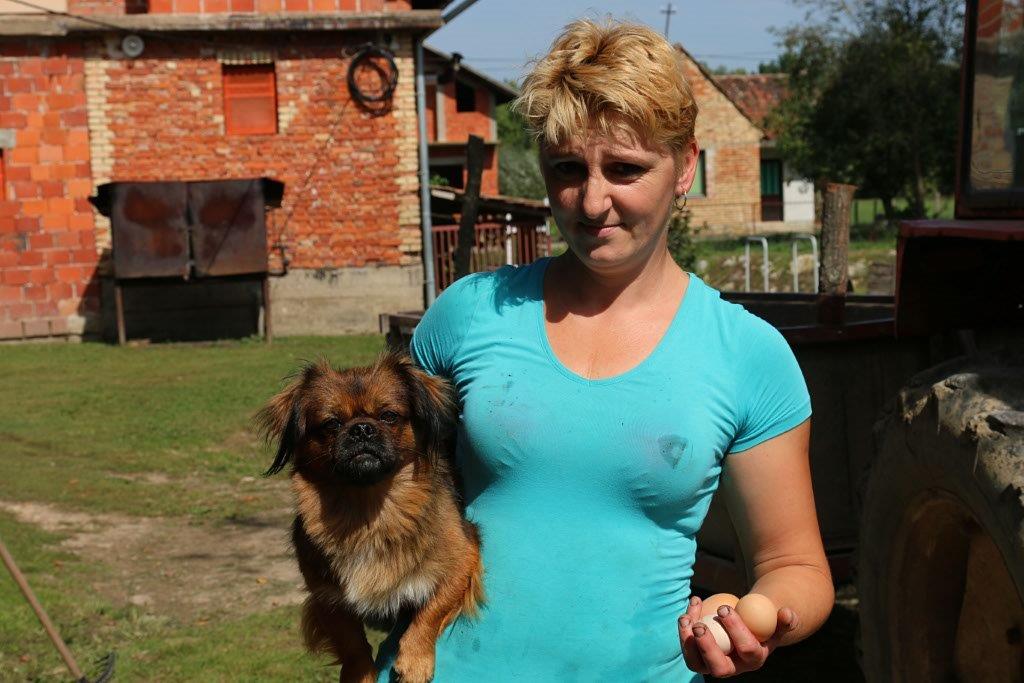
30 Nov 8: Clean bills, good friends (Croatia)
Zagreb, Croatia to Kostajnica, Bosnia (14 – 20 Sep)
Total miles so far: 825 (1,325km)
Thigh status: Unnerving
Croatia starts badly. I don’t intentionally cycle ten miles on a series of ever-shrinking country paths – each mile lumpier and less path-like than the last, until it’s almost entirely country with no path at all – but that’s what happens when you sacrifice independent thought to the whim of technology. And by the time you find yourself pedalling across a thick, spongy field with only the odd insouciant cow for company, it’s already too late to make amends.
On this particular route it takes me the best part of three hours to get not very far at all, and by noon I am seething, sweltering and ravenous. I am saved, however, by the appearance of an attractive restaurant on the bank of the Sava river, where I am directed by a group of suspicious looking soldiers loitering beneath a bridge. When I ask what they’re doing there, they smirk. ‘This is a military country,’ they say. I think they’re joking, but I can’t be sure.
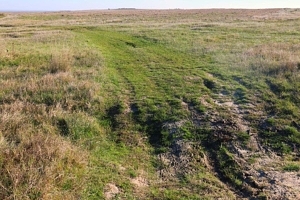
According to my satnav, this is an ‘unpaved road’. I am sceptical.
At the restaurant, I guzzle a big bean stew, basket of bread and real lemonade, all for €4 (£2.80), and chat to the manager. You can discover almost everything worth knowing about a country following a five-minute conversation with a local barista, I’ve learnt, and this one is no exception. It’s tough here, he tells me. The average monthly wage is about €750 (after tax). There’s free healthcare and education, but no jobs. Anyone with half a brain leaves.
‘There’s no industry,’ he says. ‘No production. The tycoons came in after independence and swept everything up. They built huge skyscrapers and nothing of lasting value. Money is poured into places like Dubrovnik, which nobody can afford.’
Corruption and tax abuse remain serious problems, he adds, but companies are slowly modernising. Before, a tax inspector would arrive and pluck a figure from the air; now, receipts are required for everything. ‘We have a phrase, which means something like “clean bills, good friends”. Meaning, if you settle your debts, you’ll get along well.’
Desperate to avoid more of Croatia’s fecund grasslands, I decide instead to engage in a little suicidal experimentation with the six-lane motorway for the final stretch into Zagreb. When I exit five miles later, alive but mildly traumatised, I find myself in deep industrial suburbia. The landscape is exactly as I imagined Ljubljana would be (but wasn’t): an ex-Titoist, tenement-heavy dystopia of cheerless, grey gloom.
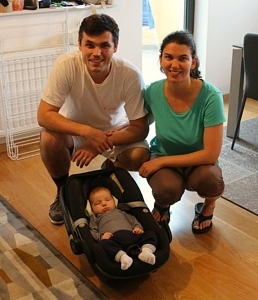
My first hosts in Zagreb, who very generously take me in for free after a mix-up on Airbnb. A lovely couple.
Tonight I am staying with a young couple who very kindly offered to put me up for free after a mix-up with the reservation on their Airbnb flat. They live in a small, modern apartment a few miles outside the centre with their six-month-old baby. Over dinner, they repeat the concerns of my friendly barista almost verbatim. No industry; no investment; no agriculture; no jobs.
The couple still remember the 1991-1995 War of Independence between Croatia and the Serb-controlled Yugoslav People’s Army — or the Velikosrpska agresija (Greater-Serbian aggression), as many refer to it domestically. Twenty thousand people died and relations remain tense now. Nobody in Croatia talks of crimes committed during the war; those that do are labelled anti-patriotic ‘Yugoslavs’. ‘I have no problem with Serbs, though,’ says D, the husband. ‘The people didn’t want the war. For most, it was imposed on them.’
I ask what was better, pre- or post-independence? I am surprised when they hesitate. ‘It’s hard to know,’ they say. ‘Everyone had jobs then. What is freedom without money and security?’ It’s a good question, which I mull on at length afterwards. Across the world, those demanding the former are almost always those denied the latter. And is it freedom at all if subverted by crooks and corruption?
Where the latter is concerned, Croatia currently seems to be at an awkward crossroads. The couple are waiting for a property licence from the council, but haven’t received it yet and are unsure if a bribe is expected or would get them into trouble. ‘No-one knows where they stand anymore.’
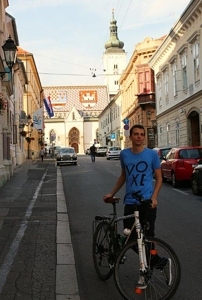
My second host in Zagreb, a 26-year-old journalist and avid cyclist, who recently rode solo to Iran.
After a delicious breakfast, including šunka šusena (dried ham), kulen (smoked sausage made from minced pork and paprika), burek (filo pastry filled with meat or cheese) and sirnica (sweet bread), I reluctantly move on. My next stop is the home of a young journalist, M, who runs a Balkans-wide magazine aimed at 15-29 year olds. His office is next-door to his family house, built by his grandfather, where he lives on the middle floor, his aunt above him and his grandfather below. His parents are two doors down. Until recently, they and his four siblings lived with him and he used to sleep on the living room sofa.
He tells me about Croatia while we drink cold red wine from the fridge. ‘We didn’t fight for independence, we fought for privatisation,’ he says. Everything was sold: the banks to the French and Italians; the telecoms to the Germans; the oil to the Hungarians. ‘Our 23-million market shrank to four million and no-one had any idea how capitalism works. Politicians are corrupt. Policemen are corrupt. Doctors are corrupt.’
M recently cycled from Zagreb to Iran and gives me advice about the country. Women don’t always cover their hair, he says. Many work and socialise, and fashion is taken ‘to a whole new level’. It’s apparently more liberal than Turkey, where women are rarely seen in public. Near Tehran, M was stopped and handed a spliff by a man in a car. Just for the hell of it.
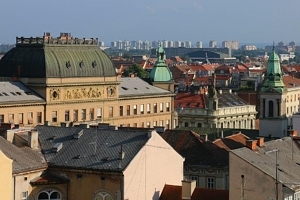
Hilltop view of Zagreb.
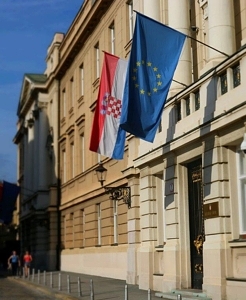
The Croatian Parliament, or Sabor, with national and EU flags.
I am given a cycle tour around the city centre, which is suitably historical and filled with cobbles, colour and patches of green. En route, we pass former female Prime Minister Jadranka Kosor walking along the pavement. It’s not unusual to see politicians wandering about, free and feral, apparently. ‘You cry “fuck you!” and they cry “fuck you!” back,’ says M. ‘It’s like a form of hello.’
The old town is particularly pretty, comprising a long, pedestrianised strip of lively haunts, as well as a statue of Croatia’s first female journalist, Marija Jurić Zagorka. The area is getting busier every year, apparently, as the government throws everything it has at promoting the tourist industry (to the detriment of everything else). Even now, dozens of selfie-stick barnacles are pouting and posturing – a phenomenon I still don’t entirely understand. Surely if you want to boast about visiting somewhere, the very fact of taking the photo is proof enough without thrusting in your girning chops and ruining it for everyone?
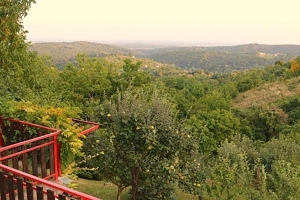
View from villa high in the hills, just 15 mins outside Zagreb.
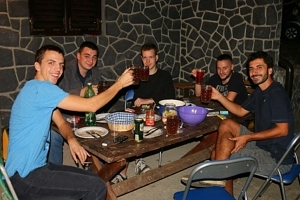
A decadent, pint-drinking evening… of herbal tea.
After the tour, we drive to a villa high in the hills to meet some of M’s friends. Beautiful views stretch into the distance, thick with fir and forest, while apples, pears, oranges and pomegranates burst from the garden. Everyone here loves cooking, tea and ‘non-industrial foodstuffs’. They work in a range of fields; one is a hairdresser and another an archaeology graduate, while our host gets up at 4am every morning to work at the market with his parents. All are sad about their country.
‘It has such good potential,’ our host says. ‘Great location, great natural resources, great coastline. The water is the cleanest in Europe. But it’s being squandered.’ The problem is not just with politics, but with people. ‘Everyone is very superficial. Some people buy cars just to have them in their driveway, as they can’t afford the petrol.’
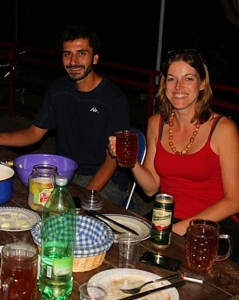
Our host, who works in the market with his parents and gets up at 4am every morning.
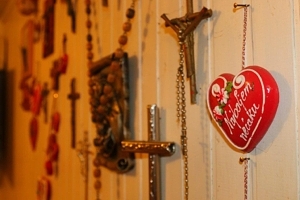
Villa decor. Croatia is a deeply religious country, with about 86% of the population identifying as Catholic.
I leave M’s the next afternoon and make it to Lekenik, just 28 miles away, when dusk starts to loom. I am beginning my usual gently panicked search for a camping spot when I inadvertently run over a dead snake on the road. My heart freezes. Oh god, I think — the fields are clearly swarming with them. As someone with a deep, irrational phobia of anything limbless, this is a worrying development.
Desperate to avoid anything over-grassy and therefore inevitably reptile-infested, I sidle instead into the backyard of one of the many half-built houses in the vicinity to snooze in in their cabbage patch. I am just about to unload when I am accosted by a busybody neighbour, who irritatingly and entirely reasonably insists on calling the owners to ask their permission on my behalf. They say no, predictably (‘a grubby vagrant wants to trespass in your tomatoes – is that ok?’), so I am once again cast into the wilderness. The man clearly feels bad, however, as he hands me an apple in recompense. Thanks, mate, but how will an apple save me from being devoured by serpents in my sleep?
As night falls, I veer impetuously into a large building site by the roadside, where dozens of trucks and bulldozers are parked beside heaps of mud and litter. It’s a dry, barren, sterile place; a graveyard of calcified souls. It’s also almost certainly snake-free. Perfect!
After a nightcap of 2011 Rojac Istra Refosk (an excellent Slovenian red with hints of berry and old boot), I fall deep asleep – only to be rudely awakened what seems like minutes later by a deafening roar just outside my tent. I scrabble out of my sleeping bag in terror, convinced I’m about to be flattened. What a way to go, I think. Crushed in a rubbish dump in my underpants. What will my parents tell the neighbours? Then, suddenly, the roar weakens, and I peek tentatively through the door flaps. I’m safe, it seems – but only just. The machines are all alive and trundling into the fields just metres away, their metalwork glinting in the pallid morning sun.
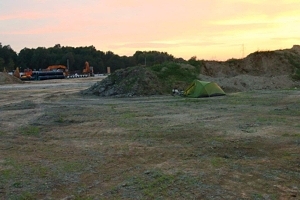
My building site B&B, with bulldozers in the background. At 6am they all crank up with a deafening roar and roll into the fields just metres from my tent. A highly effective alarm clock.
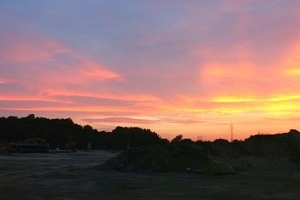
Dazzling sunset, making even this barren shithole seem rather magical.
Energised by my survival, I bound out of bed and am on the road by 8am. The route to the Bosnian border is hot and flat, each mile poorer and more rundown than the last. The land is thick with pocket-sized patches of fruit, veg and grain, while houses comprise ramshackle collections of brick and timber, as if thrown together in the dark. None, curiously, are rendered.
At first I am confused by the vast level of construction work underway, as this equates in my mind with a booming economy. But I am later enlightened. People spend all they have on building huge houses for their family – a mark of both security and prestige – and often run out of money before completion, apparently. Houses are frequently abandoned or whole floors left derelict.
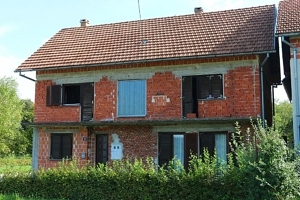
Throughout the Balkans, from the Croatian/Bosnian border onwards, almost no-one renders their houses due to lack of funds. Many remain derelict due to over-ambitious plans that drain the coffers before completion.
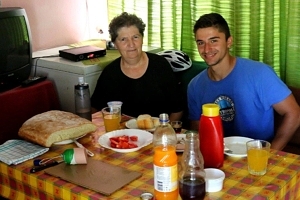
R, my 19-year-old saviour, and his grandmother, who prepares me a scrumptious homemade feast – including her potent cherry moonshine.
After a couple of hours I hit the hills, and it’s not long before I’m tired and gasping. Suddenly, as if by magic, a young man in a car appears by my side. Do I need water? Yes! A little food? Yes! Maybe a sit-down? Yes yes!
We go to his grandmother’s house nearby, who lives opposite his other grandmother. It’s a tiny, cluttered bungalow, built by her husband 30 years ago, comprising one room separated into kitchen and bedroom by a green curtain, alongside a pantry and filthy bathroom. She quickly whips me up a banquet: eggs (from their chickens); tomatoes (from their garden); bread (from her oven); and salami (from their pig). It’s a wonderful feast, and I feel my belly expand like bubblegum.
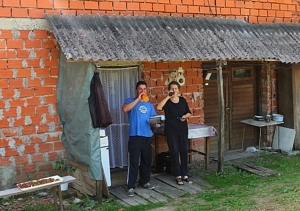
Knocking it back: R and grandma show me how to drink liquor like the locals.
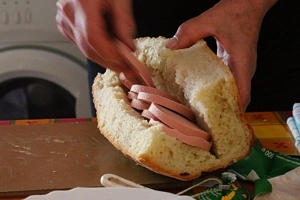
Grandma prepares me the biggest sandwich I have ever seen, which I am still digesting now.
‘We only buy meat sometimes, when we want a quick snack,’ says R, my 19-year-old saviour. He has recently graduated from high school and is now going to Germany to work ‘cleaning the environment’. If it works out, he will stay there and send his money back to his parents, as his father has just been made redundant from his factory job. ‘There is nothing for young people here,’ he says.
It is R’s first time abroad. Airfares are prohibitive, he tells me. Holidays are prohibitive, full-stop, even inside Croatia. Many people in the village chop and sell wood illegally to buttress their income, with ten metres fetching around €200. As I sit there exploiting their hospitality, I feel a gnawing sense of guilt. What luck to live in one of the most expensive countries in the world, allowing me to spread my wares liberally across the globe. Grow up in the wrong area and your postcode can become your prison cell.
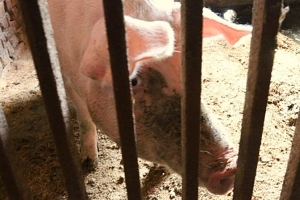
R’s family’s pregnant sow, looking sheepish (ironically).
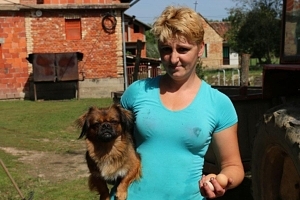
R’s 37-year-old mother, with eggs and pup.
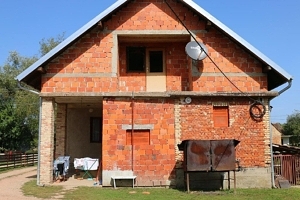
R’s parents’ house, where only the downstairs is used. His parents are constructing a new one beside it because the five-room building will be ‘too big’ for just the two of them after he moves out.
Grandma gives me some chocolate, orange squash and the largest salami sandwich I’ve ever seen to take away with me, along with a bottle of her home-brewed cherry brandy. When I ask her how strong it is, she laughs heartily and pats me on my knee. I am then taken to meet R’s parents. His father is 44, jolly and portly, and is wearing a t-shirt that says ‘this would look great on your bedroom floor’ – in English, though he doesn’t speak it. His mother is 37, with short, blonde hair, bad teeth and a mischievous grin.
They give me coffee and wafers, and I have to almost physically restrain them from feeding me again. Instead, I am given a tour of their farm, comprising 100 chicks, one pregnant sow, nine chickens and two dogs. Plus tomatoes, lettuce, chillis, peppers, apples and herbs.
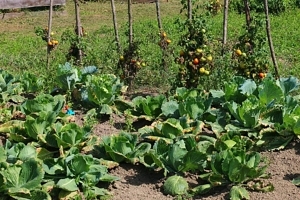
R’s garden, with a large assortment of fruit, veg and herbs.
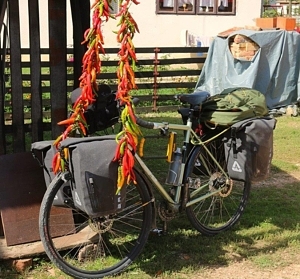
My hot set of wheels.
I wasn’t going the best way to the border, apparently, so R leads me to the more direct road on his rusty bicycle (‘my Ferrari’). He then tells me I look in my 20s and casually mentions he recently split up with his girlfriend. Is he flirting with me, I wonder? I do hope so. He’d be the first non-geriatric to do so since my trip began and it’d be a nice boost for my ego. There are few more bothersome things in the world than constant unwanted attention from men, but one is no unwanted attention.
I arrive in the border town of Hrvatska Kostajnica in late afternoon and cross the Una River into Bosnia. With only tacky bars and no green space in sight, I decide to shun canvas for a wanton night under leopard skin in the local motel (see pic). Goodbye Croatia, I think; you affable, insolvent, unrendered renegade. I very much hope we meet again one day.
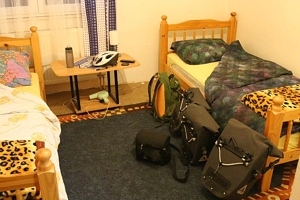


Katalin Lowe
Posted at 16:56h, 04 DecemberIt conjures up Croatia perfectly. Brought back memories of my visit a few years ago. Lovely people, but feels as if the communists were still around. Your blogs are wonderful!
Lots of love
K
reol8
Posted at 12:03h, 06 DecemberThanks, mum. My impression from talking to people was that Communism in Yugoslavia was more palatable than that behind the Iron Curtain – even if ultimately unsustainable. There certainly seem a lot of people who look back on it with rose-tinted glasses. Very different from the Hungarians, no doubt!
Love Bex x
Dick Joyce
Posted at 13:05h, 05 DecemberGreat blog, Beccy! How do you do it after a day’s cycling? Anyway, take to the hills, I say. Whatever happened to thoser tranq
Dick Joyce
Posted at 13:09h, 05 DecemberGreat blog, Beccy! How do you do it after a day’s cycling? Anyway, take to the hills, I say. Whatever happened to those tranquil, trouble-free hols we used to have in the seventies in sunny Greek islands and amidst peaceful Italian meadows. Ah well, keep it up and keep working on those tomatoes and marrows in the garden in F.Park. All best. Dick
reol8
Posted at 11:31h, 06 DecemberThanks, Dick! Though do you mind if I take to the large, flat plains instead? It’s more my kind of cycling.
Hope all well with you, and very much looking forward to a tranquil, trouble-free (inevitably surf-heavy) hol in St Just on my return.
Love Bex
Caryl
Posted at 22:28h, 09 DecemberA wonderful picture of Croatia Becky. In fact I have loved all your blogs. Particularly the humour! Keep cycling on over cobbles and fields. All the best Caryl
reol8
Posted at 12:12h, 05 FebruaryThanks Caryl! I fear cobbles and I may never repair our friendship, but maybe time will heal all wounds. Much love to you and the family x
Chris Armishaw
Posted at 08:11h, 04 JanuaryLoved reading this update, so interesting – think what you’re doing is incredible, look forward to the next update and will follow your progress on Twitter, safe travels, good cycling and more friendly people aling your road. Good luck…
reol8
Posted at 12:16h, 05 FebruaryThanks Chris, really appeciate your support and taking the time to write. Best of luck in your own brilliant cycling exploits, which are just as impressive in my book – if not more so. All best, R
Abi Lloyd
Posted at 12:39h, 21 JanuaryJust stumbled on your blog! I love it and I too love bummeling by bike only I haven’t been on a bummel as long as yours it looks great though! Very inspiring ! Good luck with the rest of your journey! I look forward to seeing all your updates !
reol8
Posted at 12:18h, 05 FebruaryThanks Abi! Great to have your support, and would be v interested to hear about your own bummelling exploits. Where have you been? All best – and do stay in touch. R
Maverick
Posted at 23:55h, 05 MayI have never even thought about taking photos of cracked egg3o#82s0;.G&od one!Love the foggy San Fran morning! And Cooper’s haircut, and the dead bird/cat tail, and knowing that you make some serious messes too.
Srdjan
Posted at 18:30h, 01 AprilCould not help noticing unkind comments about people who welcomed and fed you – filthy bathroom, bad teeth?
That is how you repay hospitality?
Leo
Posted at 14:35h, 02 AprilIt is realistic though. I felt more present, as if I was there, with the author having shared some of those observations. I have seen that first hand with my own relatives who live in remote villages.
I understand your point but I think the author didn’t diminish the hospitality she received.
reol8
Posted at 10:29h, 09 AprilThanks for your comment, Srdjan – think Leo has really summed up my response here (thanks Leo). I felt a responsibility to be truthful about the experiences, but in no way meant these descriptions as critical of the people who kindly took me in. I didn’t equate my hosts with their situation or housing: the two are separate, in my mind. But I do believe drawing attention to the difficult conditions in which many people live is important. Best – R
Žena koja je prešla Bliski istok, sama, biciklom! – Monitor.hr
Posted at 21:28h, 15 August[…] je kamiondžija hvatao za grudi – obranila se pokazavši nož. Inače, prešla je i Hrvatsku, ovdje zapis u blogu. Ovdje njen […]